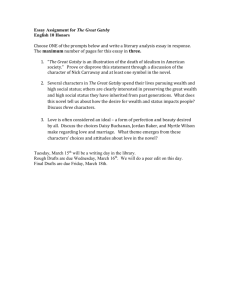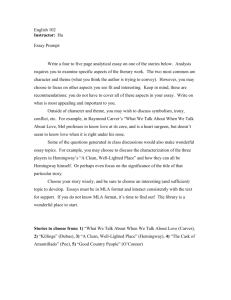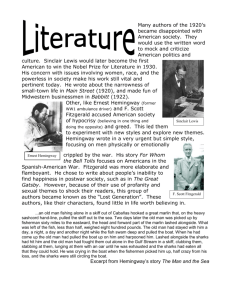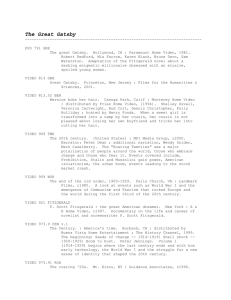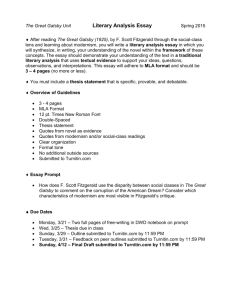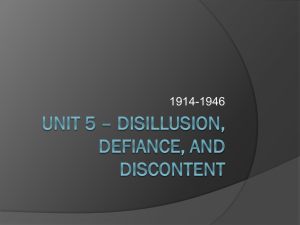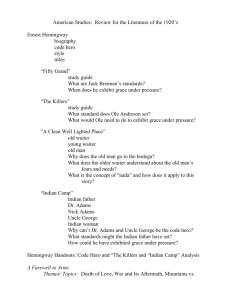File - Villmer`s Place of Wonder
advertisement
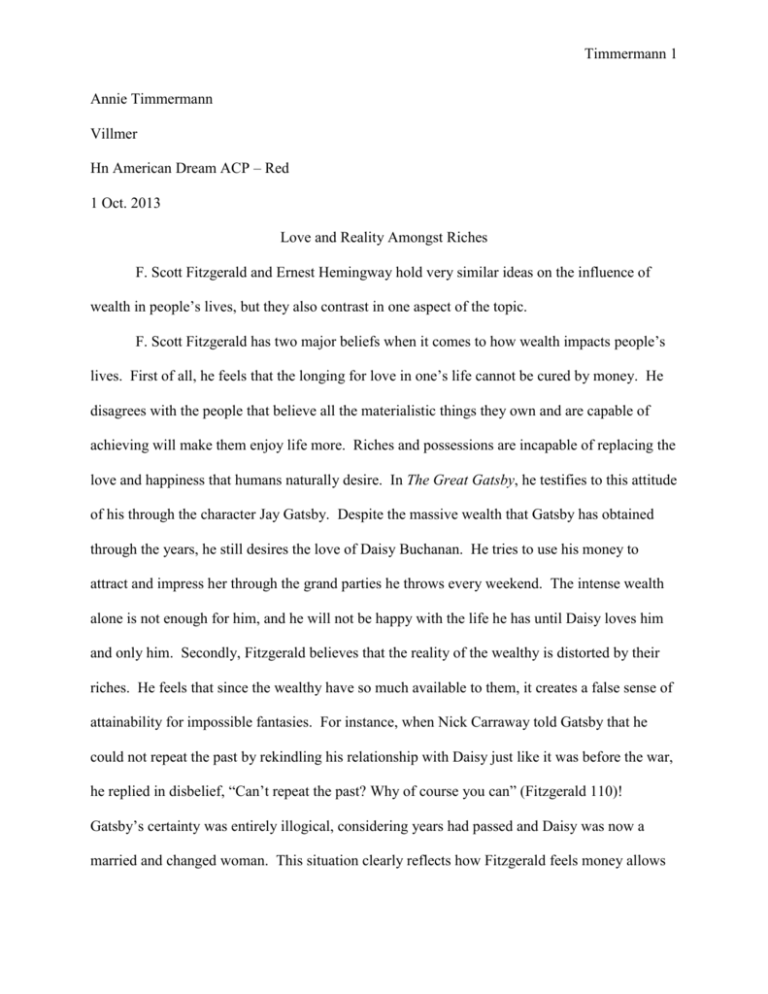
Timmermann 1 Annie Timmermann Villmer Hn American Dream ACP – Red 1 Oct. 2013 Love and Reality Amongst Riches F. Scott Fitzgerald and Ernest Hemingway hold very similar ideas on the influence of wealth in people’s lives, but they also contrast in one aspect of the topic. F. Scott Fitzgerald has two major beliefs when it comes to how wealth impacts people’s lives. First of all, he feels that the longing for love in one’s life cannot be cured by money. He disagrees with the people that believe all the materialistic things they own and are capable of achieving will make them enjoy life more. Riches and possessions are incapable of replacing the love and happiness that humans naturally desire. In The Great Gatsby, he testifies to this attitude of his through the character Jay Gatsby. Despite the massive wealth that Gatsby has obtained through the years, he still desires the love of Daisy Buchanan. He tries to use his money to attract and impress her through the grand parties he throws every weekend. The intense wealth alone is not enough for him, and he will not be happy with the life he has until Daisy loves him and only him. Secondly, Fitzgerald believes that the reality of the wealthy is distorted by their riches. He feels that since the wealthy have so much available to them, it creates a false sense of attainability for impossible fantasies. For instance, when Nick Carraway told Gatsby that he could not repeat the past by rekindling his relationship with Daisy just like it was before the war, he replied in disbelief, “Can’t repeat the past? Why of course you can” (Fitzgerald 110)! Gatsby’s certainty was entirely illogical, considering years had passed and Daisy was now a married and changed woman. This situation clearly reflects how Fitzgerald feels money allows Timmermann 2 the wealthy to live such lavish and idealistic lifestyles that something as outrageous as repeating the past would not seem far-fetched. All in all, Fitzgerald believes that excessive wealth can never compensate for an absence of love, but it can easily make fantasy feel like reality. Hemingway has both similar and conflicting attitudes in regards to Fitzgerald on the influence of wealth in people’s lives. Similarly to Fitzgerald, he feels that having money does not necessarily mean that you have love and happiness in life. In fact, people are often forced to choose between wealth and true love or happiness. Hemingway makes this attitude very clear in “The Snows of Kilimanjaro.” While dying, Harry reminisces on how he gradually loved the women he was with less and less, coincidentally as they seemed to have more and more money. Once he finally came to be with his wife Helen, he thought “it was strange that when he did not love her at all and was lying, that he should be able to give her more for her money than when he had really loved” (Hemingway 11). Therefore, Hemingway feels in choosing wealth to be part of one’s life, it leaves less room for love and happiness to be present in the mix. This clearly reveals, like Fitzgerald, that he does not believe wealth can fill the void of love. However, Hemingway also holds an attitude that does not agree with Fitzgerald. Hemingway feels that wealth does not distort people’s reality, but instead it makes their reality clearer. By this, he means that having so much wealth can make one’s problems in life more obvious to him or her because there is so much to lose. Margot Macomber, from Hemingway’s short story “The Short Happy Life of Francis Macomber,” experiences this. When her wealthy husband Francis finally becomes a code hero, she realizes how easy it would be for him to leave her and find a new woman, thus taking the wealth they presently share with him. In contrast to Fitzgerald, Hemingway reveals how he feels wealth can be an eye-opener to those who have it through Margot, instead of clouding what the reality of life truly is. Overall, Fitzgerald and Hemingway Timmermann 3 clearly hold similar views on the influence of wealth in regards to love, but when it comes to reality, Hemingway shows wealth to lead to a greater cognizance of one’s life. In conclusion, F. Scott Fitzgerald and Ernest Hemingway believe wealth and love are not interchangeable, and ultimately, wealth either warps or makes one’s reality more apparent (719). Timmermann 4 Works Cited Fitzgerald, F. Scott. The Great Gatsby. New York: Scribner, 2004. Print Hemingway, Ernest. The Snows of Kilimanjaro and Other Stories. New York: Scribner, 2003. Print. Author Comparing Evaluation Form for HN American Dream ACP Content 1. Thesis statement effectively and clearly indicates the specific focus of the essay. missing; confusing, vague; too much emphasis on characters or themes; missing mention of “comparing” 2. Presents her own thoughts and opinions clearly. statements are unclear; statements appear contradictory; statements lack support; too much plot discussed; statements are inconsistent with text; student misread text; perhaps student misread assignment 3. Uses accurate specific support: examples, quotations, facts from the novel. lacking; support poorly chosen; quotes are inaccurate, missing, too long, poorly chosen 4. Covers enough aspects of the topic to provide a complete discussion in the essay. discussion is too much about character; discussion lacks explanation of attitudes; discussion does not provide adequate comparison OF THE AUTHORS’s ATTITUDES; 5. Concluding sentence successfully “wraps up” the reflection. too much of a restated thesis; lacks relevancy; informal Form 6. Applies the Standards of Academic Writing. too informal: contractions, first person, second person, slang, informal word choice; too many “reader” references 7. Overall quality of the written prose, i.e. the essay construction itself. essay is difficult to follow and/or understand; essay is poorly constructed; essay writing skills need revision, proofreading; topic sentences are weak, missing Weak Avg. Strong Weak Avg. Strong Timmermann 5 8. Appropriately identifies quotes and uses internal parenthetical citations. missing; improperly formatted; works cited page errors: spacing, alpha order missing, info missing Common comments, highlighted: essay was well written; analysis was high quality; analysis was insightful; good command of expository writing skills; essay was pretty good but lacked literary analysis; essay lacked adequate support for thesis statement; analysis was superficial and lacked depth; Academic writing skills were poorly executed; too much plot and not enough expository; lack of writing skills = confusing read Too short/long (-1, -2, -3) Late (-20%), MLA errors (-1, -2) 500-800 words; works cited required Works Cited missing (-2) Overall: essay failed to follow assignment: comparisons of the authors missing or poorly elaborated; too much information on biography; too much information about characters; authors’ attitudes are unclear, missing _______% = __________ /75: Final Grade BFV/10 See below for Statement of Mastery Statement of Mastery: Essay Writing Criteria Accuracy of your Interpretation Use of evidence Clarity of your essay writing skills Accuracy of your use of MLA Accuracy of your adherence to the rules of grammar and mechanics Does not meet expectations Below Average Above Average Average Line indicates class expectations Exceeds expectations Excellent Superlative

